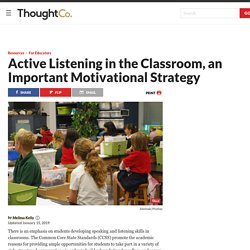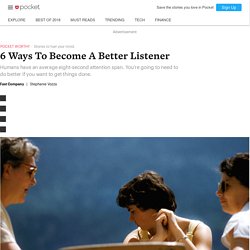

How to tell a story. Teaching Active Listening in the Classroom. There is an emphasis on students developing speaking and listening skills in classrooms.

The Common Core State Standards (CCSS) promote the academic reasons for providing ample opportunities for students to take part in a variety of rich, structured conversations in order to build a foundation for college and career readiness. The CCSS suggest that speaking and listening be planned as part of a whole class, in small groups, and with a partner. But research shows that it is listening — really listening — to students that is critical to the student/teacher relationship. Knowing their teacher is interested in what they are saying makes students feel cared for and emotionally connected to their school. Since research shows that feeling connected is necessary for students' motivation to learn, showing that teachers listen is important not only as a matter of kindness but also as a motivational strategy.
Are You A Good Listener? Being a good listener is an essential skill that all people could probably work on.

Need some more ideas about how to improve your own listening skills? Start with: 9 Things Good Listeners Do Differently. Learn how to be an active listener here! Who’s listening? Who’s talking? Who’s listening?

Who’s talking? The much discussed concept of learners identifying problems – not only solutions is at the forefront of mind today. There is much talk around teachers who talk too much. We know this is real. We know we all do it. Today I sit with a Year 6 child who is on her PYP Expedition. I listen while she talks and I create a mind map of her thoughts and suggestions. When our time is up she says,”This feels more like what I want to be doing”. I am left pondering some of my own “big questions” … Who’s doing the listening when children are talking? Who’s doing the talking? What message do children get when their voices are shut down? What buy in is there from learners if there questions are forced; paraphrased and contained? Do we all have an idea of why it’s important to know ,”Who’s listening and who’s talking”? Like this: Like Loading...
About Jina Belnick. Comprehension Strategies - Cultures of Thinking. How to make good arguments at school (and everywhere else) From as early as Grade 3 teachers start teaching children how to put across their own points of view.

It’s not about winning arguments, but ensuring kids grow up to be thoughtful and engaged citizens. These skills might come in to play at school in essay writing, in oral presentations or in debates. And whether we’re talking about making arguments for school or just in life, there are three things present in all good arguments. Read more: No, you're not entitled to your opinion 1. Reasonability is about connecting reasons and evidence to your opinions. The first is for our own clarity of thought, so we understand how concepts and events relate to each other (or realise when they don’t). The second is so others can assess our reasons. One shortcoming in the Australian Curriculum is that it asks students to write persuasively, by using emotive language. Read more: What's the best, most effective way to take notes? 2. 3. There are several major benefits in recognising our own fallibility.
How to Talk Less to Improve Learning. Start With Struggle Jo Boaler, a revolutionary researcher and math educator, says that struggle is critical to mastering a skill or concept.

When we sense discomfort in our classrooms, we can be quick to explain and provide steps to follow. But removing the struggle for students also removes the cognitive heavy lifting that leads to deep learning and understanding. Shift the script and begin lessons by asking students to experience struggle. Explain what you are doing and how grappling with concepts will help them learn before support is given. In other subjects, use brain research to encourage students to persevere through writer’s block or try a task for a second or third time.
Reduce Teacher Talk Time In effective classrooms, students see themselves as their own teachers, and teachers know the impact that their strategies have on students’ learning. A few simple strategies can help shift the teacher from lecturer to facilitator: Use Questions Instead of Explanations. 10 ways to have a better conversation. 6 Ways To Become A Better Listener - Fast Company - Pocket. Photo by Les Anderson via Unsplash Ever zone out while someone is talking?

Of course. We all do. The average human has an eight-second attention span. With electronic distractions competing for your time and an abundance of responsibilities at work, it makes listening attentively to someone else speak pretty difficult.